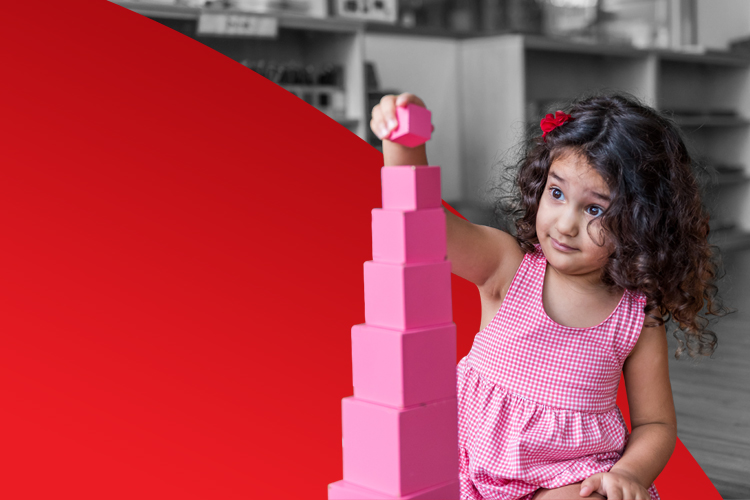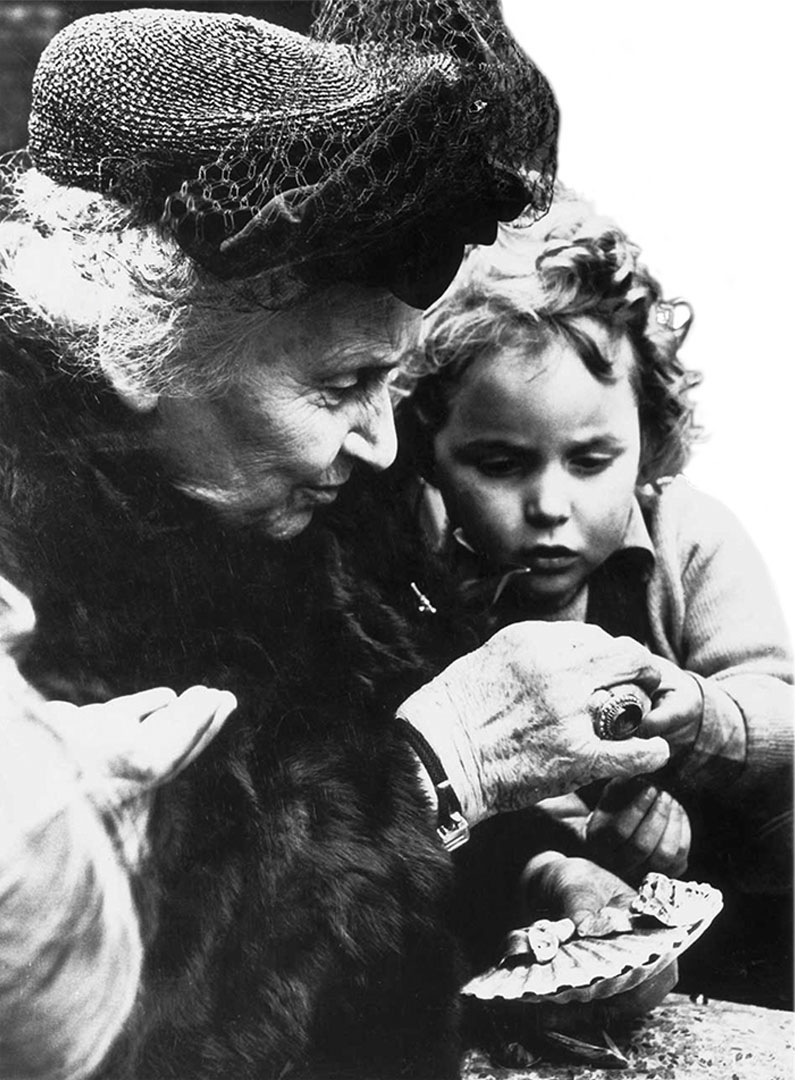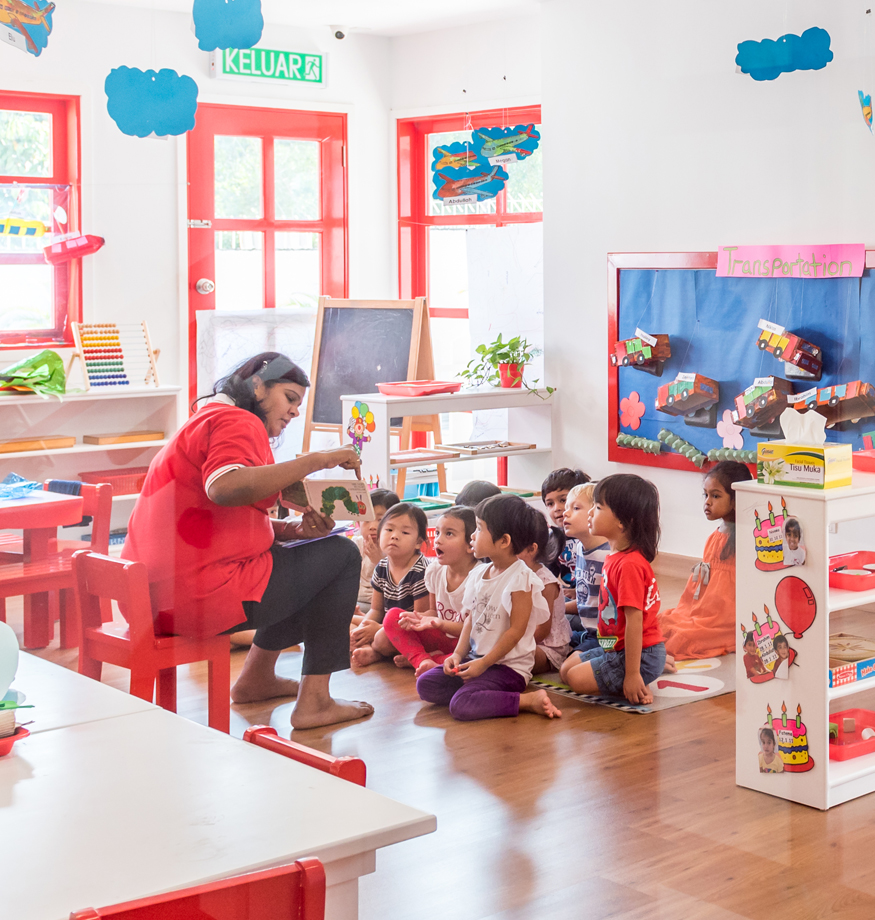


“Montessori is an education for independence, preparation not just for school, but for life”
– Maria Montessori
Dr. Maria Montessori, a brilliant Italian woman, a doctor, an anthropologist, a psychologist, philosopher and an educationalist, saw the inner goodness in children. She advised nurturing a child’s sense of wholeness: their mind, intellect, personality, temperament, body and most particularly spirit. Her vision of educating the whole child is an inspiration to all of us who choose to continue her work.
45 years of her adult life was devoted to education, she extensively researched and established her method of educating young children in the 20th century. We are now in the 21st century, and her legacy lives on, even more relevant today.
Her books and lectures described the nature and sensitiveness of a child’s magical mind, which she termed the Absorbent Mind. This unique mind of the child has real constructive energy and intellectual powers. She stressed that there is a remarkable force in humans and this force is most powerful during the first phase of human life, which is the childhood phase from birth to six. Her belief is that children are endowed with the capacity to learn and they should be provided with a wealth of information to enrich their understanding of all aspects of the world.
Dr. Montessori was not just a theorist but a pragmatic educator, a genius who documented this unique teaching approach which she termed as scientific pedagogy, supported by teaching materials which were meticulously designed to fit the child’s hands. These materials have stood the test of time and geographical divide, as you can still find them in Montessori preschools, in any part of the world.
“ Children has shown me that humanity is one. ”
~ Dr. Maria Montessori
The Montessori environment was designed to be spaces where the perspective of the child was paramount.
When Dr. Montessori first designed her teaching materials, the concept of self-correction was very important to her. This self-correcting feature enables each child to develop independence, as well as fosters the child’s ability to progress at the pace that is unique and perfect for her.
An active learning style is nurtured in Montessori classrooms. The children are encouraged to seek answers to their questions, to follow their interests, and to develop to their fullest potential. The curriculum serves to answer each child’s needs, rather than bind each child in a rigid sequence. The children are motivated to learn and to excel, and consequently are empowered by feelings of intrinsic satisfaction and self confidence.
Each classroom is a living community. The children have the opportunity to establish friendships not just amongst their own age groups, but also with children younger and older than themselves. The mixed aged groupings create relationships that are satisfying to all. They thrived on routine, tidiness, communal meals, and above all, the freedom to move, choose and socialise in a non-competitive, calm and harmonious environment. They observed good manners spontaneously, and their social and intellectual capabilities were evident.
Over 108 years, these classrooms have been duplicated in all continents, except Antarctica. We, at The children’s house, are privileged to be able to see, year after year, this positive transformation of children in Malaysia and many others from different countries; this ‘normalisation’ process of children as described by Dr. Montessori.

Dr. Maria Montessori, a brilliant Italian woman, a doctor, an anthropologist, a psychologist, philosopher and an educationalist, saw the inner goodness in children. She advised nurturing a child’s sense of wholeness: their mind, intellect, personality, temperament, body and most particularly spirit. Her vision of educating the whole child is an inspiration to all of us who choose to continue her work.
45 years of her adult life was devoted to education, she extensively researched and established her method of educating young children in the 20th century. We are now in the 21st century, and her legacy lives on, even more relevant today.
Her books and lectures described the nature and sensitiveness of a child’s magical mind, which she termed the Absorbent Mind. This unique mind of the child has real constructive energy and intellectual powers. She stressed that there is a remarkable force in humans and this force is most powerful during the first phase of human life, which is the childhood phase from birth to six. Her belief is that children are endowed with the capacity to learn and they should be provided with a wealth of information to enrich their understanding of all aspects of the world.
Dr. Montessori was not just a theorist but a pragmatic educator, a genius who documented this unique teaching approach which she termed as scientific pedagogy, supported by teaching materials which were meticulously designed to fit the child’s hands. These materials have stood the test of time and geographical divide, as you can still find them in Montessori preschools, in any part of the world.
“ Children has shown me that humanity is one. ”
~ Dr. Maria Montessori

The Montessori environment was designed to be spaces where the perspective of the child was paramount.
When Dr. Montessori first designed her teaching materials, the concept of self-correction was very important to her. This self-correcting feature enables each child to develop independence, as well as fosters the child’s ability to progress at the pace that is unique and perfect for her.
An active learning style is nurtured in Montessori classrooms. The children are encouraged to seek answers to their questions, to follow their interests, and to develop to their fullest potential. The curriculum serves to answer each child’s needs, rather than bind each child in a rigid sequence. The children are motivated to learn and to excel, and consequently are empowered by feelings of intrinsic satisfaction and self confidence.
Each classroom is a living community. The children have the opportunity to establish friendships not just amongst their own age groups, but also with children younger and older than themselves. The mixed aged groupings create relationships that are satisfying to all. They thrived on routine, tidiness, communal meals, and above all, the freedom to move, choose and socialise in a non-competitive, calm and harmonious environment. They observed good manners spontaneously, and their social and intellectual capabilities were evident.
Over 108 years, these classrooms have been duplicated in all continents, except Antarctica. We, at The children’s house, are privileged to be able to see, year after year, this positive transformation of children in Malaysia and many others from different countries; this ‘normalisation’ process of children as described by Dr. Montessori.